 |
In the first chapter of this book, we stressed how the "plundering" of the colonialist powers had sucked dry the natural resources of all the nations of Africa and brought them to the edge of terrible poverty. Due to their distorted mentality, Western nations, which saw the peoples of Africa as "a primitive race which had not yet completed the process of evolution" and believed they had the right to exploit those countries, were particularly repressive towards Muslim peoples. This oppression was carried out openly between the fifteenth and nineteenth centuries, after which it was carried on secretly in the twentieth.
 |
Colonialist powers such as Britain and France abandoned the region when they could no longer hold onto their colonies in Africa, although they turned over the running of the state to "puppet regimes" close to them. This policy allowed the colonialist system to carry on in a new guise. Governments with close links to the former colonialist powers are running some African countries today, and the cruelty is carried out by these people. These puppet administrations are usually members of Christian or other minorities in mainly Muslim countries. With the support these minority governments receive from the West, they have been able to continue to repress Muslims. As a result of this, large-scale civil wars have erupted between Muslim majorities and minority administrations, and nations have been plunged into . These conflicts are still continuing in many countries today.
Another method employed by the colonialist powers was to bring to power leaders who won public sympathy by wearing a mask of religious belief but who in reality were deeply anti-religion. No matter how much these governments may claim to be Muslim, they have nevertheless oppressed the Muslim population and prevented them from carrying out their religious obligations. The most obvious examples of this can be seen in countries such as Algeria and Tunisia.
The history of Chad is similar to that of Algeria and Tunisia. It won independence after long years of colonialism, after which there began another long period of civil war and unending .
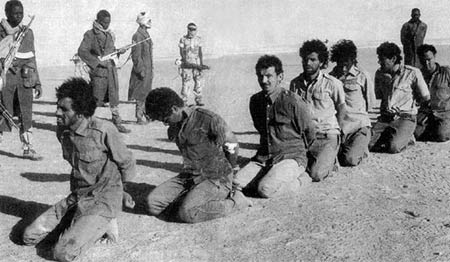 |
| The French occupation, which lasted from 1900 to 1960, witnessed inhumane policies of all kinds, cruelty, oppression and violence. French forces waged war on the people of Chad and Islam using tanks, rifles and bombs. After independence, the pro-French regime continued the oppression. |
Chad became Muslim when the King of Kanem turned to Islam in 1086, and by the sixteenth century it was one of the wealthiest and most powerful countries in the region. However, the kingdom was weakened by internal divisions in the nineteenth century, was occupied by the French in 1900, and became tied to France's other colonies.
From that moment on, colonialist French forces waged war against the Muslim people and the religion of Islam. The war witnessed the use of the full battery of inhumane practices, cruelty, oppression and violence. The first aim was to destroy the Islamic identity of the people of Chad and replace it with a more materialist and non-religious one. To that end all mosques, Qur'anic courses, centers of religious education and libraries were either closed down or demolished. The occupying French forces prevented Muslims from learning about their religion by banning Islamic education. They closed down all religious foundations and associations. Most teachers, imams and student were convicted of crimes. Some were killed in the ongoing oppression, and others were forced to flee to the deserts or mountains. Those religious figures who were detained were either strangled or tortured to death. Only the children of French soldiers were able to study in the schools that were opened, and health and recreation centers were also established for them. Nobody was interested in the slightest in the local population's health problems.
Muslim intellectuals in Chad and those who wished to escape the persecution had to flee to various other countries. Some Muslim religious figures were paraded naked around town centers, women's honor was mocked, and they were then executed. All forms of worship and religious meetings were considered crimes against the state. In 1917, the French administration in Chad carried out an enormous massacre. Announcing that a conference was to be held to re-establish religious life in the county, the French authorities invited all the Muslim scholars remaining in Chad, many of whom turned up. However, a French commissioner had brought in and readied hundreds of killers with knives and daggers. The surrounding area had been cleared of its civilian population, and the military units were ready and in position. By the time anybody realized that there was a plot, it was too late. In the end, everywhere was covered in savagely mutilated bodies. The barracks were flowing with blood. Those who brought about the savagery were waving their cleavers and shouting war-cries, after they were done.
The conflict between the local population and French troops went on for years. Chad finally gained independence as a result, in 1960. However, just like in other African countries, independence did not mean peace and security for the population. That is because a Christian from the Progressive party, with close links to the former colonialist power France, was brought in to lead the country with its Muslim majority.
He followed the French line in terms of cruelty and oppression. There was a huge outcry from the Muslim population to François Tombalbaye being made both president and prime minister, and when Chadian intellectuals who voiced that protest were killed, there were uprisings all over the country. Following that, a harsh crackdown began, again aimed at Chad's Muslims. The Iraqi writer Imaduddin Khalil describes the events in his book Afrika Dramı (The Drama of Africa):
On March 22, 1963, the Chad Cabinet was restructured, with all Muslims being removed from their posts, and non-Muslims were brought in to replace them. The former foreign minister was exiled, and that same day the president gave the order for the arrest of the chief justice, the minister of justice, the head of the Motherland Association and many other prominent figures. They were brought before the courts 35 days later. The court decided that the chief justice should be removed from his post and exiled on the pretext that he was not a citizen of the country. His goods were also to be seized. The other detainees were to be kept in prison. The president then began to use force and repression against the Islamic movement. That in turn gave rise to a popular revolt in which a thousand people were killed and many thousands injured. So-called special courts were then established, and leaders of the Islamic movement and former ministers were tried by these. Sentences ranging between 15 years to life in prison were handed down. This atmosphere of unrest and intolerance in Chad has survived down to the present day.42
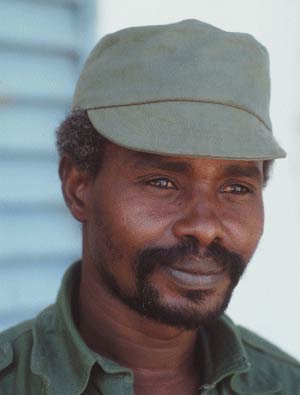 |
| Hissene Habré |
Political instability in the country grew when François Tombalbaye, the head of state, was killed during a military coup in 1975, and the civil war that began in 1980 took on ever more serious dimensions. There were two sides in the conflict: the Muslims in the north of the country, and Christians and other tribes with their own local religions in the Bantu area to the south. As in most Third World countries, however, this was not actually a "civil" war at all. Foreign powers actively supported the combatants. Israel, always opposed to Islam, headed the list of these foreign powers by backing the Bantus in the south.
The leader of the northern Muslims was Goukouni Oueddei. The interesting thing though is that at the head of the southern Christian-animist alliance was a so-called Muslim, or rather a man of Muslim origins, Hissène Habré .
Israel, together with the CIA, supported Habré's forces and gave them Soviet-manufactured weapons. In 1983 it emerged from a number of sources that Israel had military advisors in Chad, and that they had gone there in August of that year together with 2,500 Zairois troops to support Habré's forces. Ariel Sharon, the "Butcher of Lebanon" and one of the main players in the oppression of the Palestinians, played an important role in the war in Chad as well. He had paid a visit to Chad in January 1983 just prior to leaving his post at the Ministry of Defense. According to Hallahmi's account, this visit by Sharon was an indication that Israel was ready to play a greater role in Chad.
As we have seen, Israel tried all it could in terms of military and political support to prevent Muslims from growing stronger.
There was still no peace and security in Chad after the civil war. External intervention by France and Israel increased the violence of the clashes every day, and Chad turned into a nation of military coups. The government left thousands of dead and tens of thousands of refugees behind in its killing spree to eliminate the opposition.
The situation in Chad today is one of the clearest examples of what anti-Islamic forces can do to a country. All its wealth has been destroyed, stability is but a dream, a population which lived together peacefully for many years is now riven by hostility, and Chad has become a by-word for poverty.
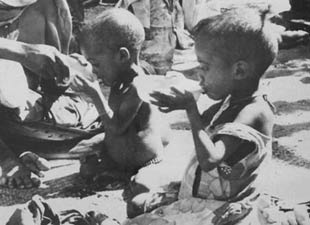 |  |
 | 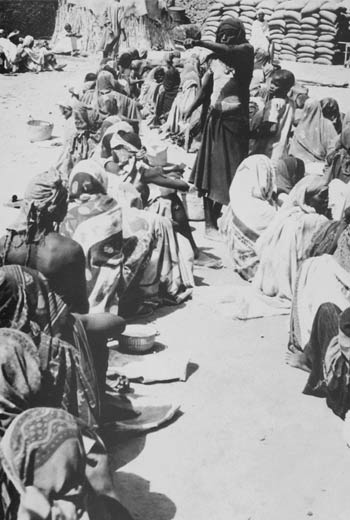 |
 | |
| Archaeologists, botanists, geologists and other experts from France came to Chad in large numbers and carried out surveys and studies. The underground resources thus identified were transferred to France. As a result the local population, which had lost all its wealth, fell to fighting among themselves after living in peace for many years, and Chad was turned into a nation of abject poverty. | |
What we must not forget, however, is that this is still no cause for despair. There is a very easy solution to that negative picture. That consists of the practice of undiluted Islamic morality. When this happens, all those problems that have proved insoluble for centuries will be resolved one by one, and peace and security will replace war and conflict. In an environment where Islamic morality prevails, unfairness and injustice will have no place.
All the cruelty witnessed in Chad reveals once again the wrongs suffered by the Islamic world, together with the urgency and importance of a war of ideas to rectify the situation. Muslims in a country of Africa are suffering oppression simply because they are Muslims, and that is something that concerns every Muslim worldwide.
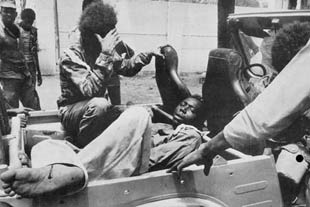 | 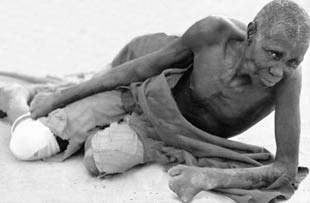 |
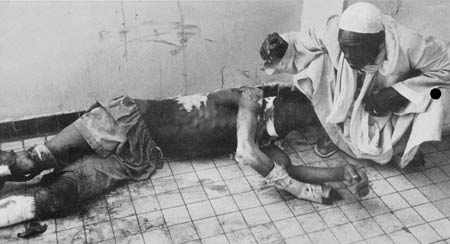 | |
| Those of you possessing affluence and ample wealth should not make oaths that they will not give to their relatives and the very poor and those who have emigrated in the way of Allah. They should rather pardon and overlook. Would you not love Allah to forgive you? Allah is Ever-Forgiving, Most Merciful. | |
We must realize that that the unbelieving leaders, who have oppressed Muslims down through history, and their supporters, have actually gained nothing. Even if they die at the helm of great world powers, they will suffer eternal torment in the hereafter. Allah's infinite justice will be visited on them, and each individual will be called on to account for his deeds. That is a promise Allah has made to believers, and is at the same time the most wondrous news. Allah says in the Qur'an:
Those who persecute men and women of the believers, and then do not repent, will have the punishment of Hell, will have the punishment of the Burning. (Surat al-Buruj: 10)
If every self that did wrong possessed everything on earth, it would offer it as a ransom. They will show remorse when they see the punishment. Everything will be decided between them justly. They will not be wronged. (Surah Yunus: 54)